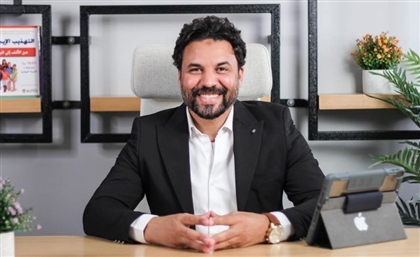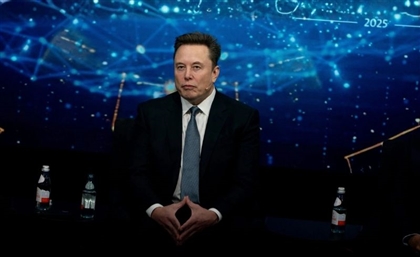The 5 Biggest Challenges for MENA Startups, Explained by the Man behind Data Pioneer Magnitt
Originally Iraqi but Dubai-bound, Philip Bahoshy has been silently working to crystallise the Middle East's startup ecosystem through his big data platform, Magnitt. In a talk with Charlotte Swan, the man behind the math unveils 5 reasons the region lags.

Philip Bahoshy is a numbers man. His brainchild, Magnitt, has swiftly raised to notoriety since its launch in 2014, with most of his investment reports and regional insights going viral across the region, crystallising the growth of a startup ecosystem that is witnessing an all-time high, with $290 million in funding only in the first six months of this year.
As the founder of a startup for startups, he’s something of an entrepreneur’s entrepreneur. “It’s really fulfilling trying to understand the ecosystem. Being a data startup in the region, I have all the same pains everybody else faces: it’s expensive, it’s bureaucratic, it’s difficult to raise funds or find the right talent or mentors. Whenever I’m speaking to entrepreneurs, I’m facing the exact same challenges as them and I have to find more ways for Magnitt to support not only myself specifically but them as well,” he says.
The Dubai-based, British-educated young ingenue has long been an overachiever, from his education at London School of Economics and Political Science to his prior work as Chief of Staff at Barclay’s Wealth MENA. True to form, when he founded Magnitt in November 2014, Bahoshy went above and beyond in the scope and quality of his research: the site not only offers a database that includes over 3,000 startups in the region, but also regularly features data-heavy reports and analysis of the regional startup ecosystem and a forum called #askmagnitt, where entrepreneurs and investors exchange tips and experience.
He wasn’t always a startup scholar, though. Inspired by his courses at INSEAD, Bahoshy became intrigued by entrepreneurship after a particularly strenuous startup bootcamp simulator. Thrown into a pitching competition but lacking specialized business, legal, and management training, Bahoshy realized that the experience was educational but incomplete. “You were beholden to the investors that were in the room, and I saw that people had the mentality of criticizing and not being constructive. But we didn’t know how to get the help for the all of the pieces that were required of an entrepreneur,” he details. Ever the problem-solver, he began asking how the solutions to this problem could be outsourced, and his answer became the birth of Magnitt 1.0, which was originally directed at MBAs. Later, as he moved to Dubai, he realized he needed to tighten his focus, and thus the MENA-targeted resource was born.
So, what’s in a number? Here's five things data can tell us about the Middle East's regional challenges, explained by the Magnitt magnate. 
1. It's expensive and bureaucratic
The path from ideation to actualization of a viable business is lined with miles of red tape. Aspirational young entrepreneurs frequently find themselves leashed by stifling licensing fees and requirements. For example, business registration fees in the GCC can cost thousands of dollars, which is a stiff order for nascent businesses. Government entities can also be slow and complicated. According to World Bank data from 2016, it takes an average of 20.2 days to open a business in MENA countries, versus a mere 5.6 in the United States.
Bahoshy stresses the need for improvement of business legislature. “It’s expensive, it’s costly, and it’s bureaucratic. When it comes to addressing these issues, the first things we need to ask are how we can get over the cost of incorporation, the legislation, and the bureaucracy. Government entities should foster an environment to make it easier not only to set up startups, but to fail and try again. That could be bankruptcy law, regulation, incorporation, or visas, for example. I think many governments are aware of this and aiming to change this, but that’s the first issue.”
2. There is a definite need for capital
Recent years have seen growth in investment activity from international organizations and corporations. One such example is Saudi Arabia’s recently-established Vision Fund, which at a staggering $100 billion is now the world’s largest private equity fund, backed by multinationals such as SoftBank, Apple, Qualcomm and Sharp. The US-based 500 Startups announced the first closing of its new MENA fund in May. While the increase in international interest is promising, gaps in different stages of funding remain a critical issue.
The data cruncher stresses one particular area of dire concern. “There’s a definite need for capital," he says. "Depending on which startups you speak to or which conferences you go to, different people will say that a different level of funding is needed. My firm belief is that while it’s important to have Series A or Series B funding – and there is a lack of funding in that space – fundamentally, there is a whole lack of angel funding to kick-start startups, to get them to the stage where they should be pitching to VCs. 49 percent of the startups that are looking for funding on Magnitt are looking for less than $250,000 in funding. That is angel funding by international benchmarks, yet many of those guys are pitching to VCs. It’s not the fault of the VCs that they aren’t investing in the startups, it’s just that these companies are not VC-ready and they usually need angel funding to get to that stage. One of the things that needs to be addressed is how angels in this region can be incentivised and educated.”
3. Where is the data?
The lack of a cohesive data aggregate can make researching the industry – and preparing for success - difficult. When it comes to business, knowing the numbers is essential. Being a data hoarder, Bahoshy would know. “There’s no independent reporting of data in the region. And for me that’s extremely important and the core of the Magnitt proposition.
Effectively, Magnitt came about trying to connect stakeholders one or two steps before they get to funding,” he details. “How do you create bite-sized and understandable information pieces that can empower decision makers and stakeholders, whether they’re government, investors, or corporates, to be able to make informed decisions? Everyone is talking about startups, everyone is talking about innovation, but a lot of the talk has been theoretical —‘I think there’s been this much money, I think there’s been this many exits, I think this is what it takes to be a good founder in the region.’ And every time I bring out these reports, which are substantiated by the data on Magnitt, I look to try to address those questions with data points.”
4. MENA entrepreneurs and "Tunnel Vision"
Is the prolific press surrounding MENA startups narrowing the entrepreneurial outlook? “I think one of the challenges that we face is that we get so tunneled in this region that we sometimes don’t look outside to see what’s going on,” explains Bahoshy. “Many of the challenges that we face are faced by other regions as well. They have many of the same success stories we do, it’s just that we do a very good job of publicising it all the time, whereas other ecosystems are a little more under the radar, he says, reiterating the need for bureaucratic overhaul over endless press. “Publicity is key, I think awareness is important and we’re beginning to see that drive activity here in the region, but fundamentally some of the bureaucratic and infrastructural challenges here need to be addressed if we are to take the ecosystem to the next level.”
It doesn’t stop with just press, though. The issue also pertains to the business strategy of founders in the region. “Additionally - and this is most important - for startups to be successful in this region, they need to have a minimum of a regional outlook, if not a global outlook. It’s okay to start in a city. It’s okay to start in Cairo. But your business cannot be focused purely on one city. And you need to have a road map for regional or global aspirations if you look to achieve VC-end growth in your company.”
5. Regional fragmentation leaves "room for consolidation"
Despite the scope of size and diversity across the region, many MENA countries still share similar issues tackled by multiple startups with convergent goals. Bahoshy gives an example as to how consolidation could expand reach and reduce numbers of “duplicate” startups: “say there are five different startups that are addressing the same issue in Kuwait, Saudi Arabia, Emirates, Lebanon, and Jordan - perhaps none of them is yet getting the funding they need because they’re being told the market isn’t big enough,” he outlines. “I think corporations could have a big role to play in this situation. There’s a lot of room for M&A [mergers and acquisitions] activity with startups. If a company chooses to merge two or three of these startups, they can create a super-startup with the proper team, funding, and foundation to fuel a successful business. There’s room for consolidation.”
In general, communication is an issue for entrepreneurs across the Middle East. Bahoshy finishes with emphasis on the need for more conversation between innovators in the region. “Not enough work is being done to embrace and bring the community together as a voice to challenge the norms. Entrepreneurs don’t spend enough time speaking to other entrepreneurs to empower one another. When founders speak, we realize we all have similar challenges.”
Photo by @MO4Network's #MO4Productions.
Photographer: Mo Ezaby.
- Previous Article Bassita: Click Funding for a Better Egypt
- Next Article I Married My Business Partner: What's it Like to Mix Family and Startup Life






















